1. 
2. 
3. 
4. 
5. 
6. 
7. 
8. 
9. 
10. 
11. 
12. 
13. 
14. 
15. 
16. 
17. 
18. 
19. 
20. 
21. 
22. 
23. 
24. 
1. 
2. 
3. 
4. 
5. 
6. 
7. 
8. 
9. 
10. 
11. 
12. 
13. 
14. 
15. 
16. 
17. 
18. 
19. 
20. 
21. 
22. 
23. 
24. 
The filing in of nominations by candidates for the Livingstone parliamentary by-elections have started at the Livingstone City Council.
Opposition Movement for Multiparty Democracy’s (MMD) Fred Siasuntwe was the first candidate to file his nominations at 10:00 hours.
Mr. Siasuntwe was flanked by nine supporters who were led by the party’s Vice President Michael Kaingu.
He was also accompanied by overzealous party cadres who waited outside council chambers as he (Mr. Siasuntwe) filed in his nominations.
Two other candidates, United Party for National Development’s (UPND) Regina Musokotwane and Patriotic Front’s Lawrence Evans are yet to file in their nominations.
The filing in of nominations is expected to end at about 15:00 hours today.
The Livingstone by-election, which is scheduled to take place on 28th February 2013, fell vacant after former UPND MP Howard Sikwela resigned from the opposition party due to alleged hostility from the party members.
Ballot papers for the forthcoming Mpongwe and Livingstone parliamentary by-elections will be printed in the United Kingdom-UK-.
Electoral Commission of Zambia (ECZ) senior Public relations Officer, Sylvia Bwalya has told ZNBC news that ballot papers will be printed by a firm known as Smith and Ouznam.
Ms. Bwalya has also disclosed that ballot papers for the 36 ward local Government elections will also be printed in the UK by smith and ouznam.
Ms. Bwalya says this is not the first time that ECZ has used the UK based printing firm for ballot papers.
She says ballots papers for the Mufumbwe by election were printed by the same company.
She explained that ECZ has not used government printers to print ballot papers for the Livingstone and Mpongwe by-elections because government printers are not ready to undertake such an exercise.
But the Government printers recently told ZNBC news that the department has the capacity and is ready to print ballots papers.
Meanwhile, the ECZ have reminded media houses to give free and fair coverage to all political parties that will contest the forthcoming Mpongwe and Livingstone parliamentary by-elections.
ECZ commissioner, Fredrick Ngandu made the call when he addressed stakeholders at Mpongwe city centre on Wednesday.
ZANIS

Zambia’s annual rate of inflation for January reduced to 7 percent from 7.3 percent on account of reduced food prices.
Central Statistical Office Director John Kalumbi told Reporters in Lusaka that the annual rate of inflation may reduce further as captured in February after decreases in the price of mealie meal following goverment’s intervention.
Mr. Kalumbi said there were decreases in food and non alcholic beverages, housing, water, electricity, gas and other fuels over the same period.
On trade, Mr. Kalumbi said Zambia has continued posting positive trade surpluses, meaning the country has been exporting more than it has been importing.
He said in December 2012, Zambia exported KR 135.9 million worth of goods from KR 112.8 million recorded in November 2012.
The CSO Director said Zambia’s major export product was Copper Cathodes which went to destinations such as Switzerland, China and South Africa.
Hunt for Successor 34:
By Field Ruwe
The overbearing Wynter Kabimba is about to press the red button and blow up the future of our children. He is taking them to the primordial era and turning them into dinosaurs. That’s the problem. When we entrust a few individuals with our lives they subject us to political oppression. This whole idea of replacing English with local languages in schools is preposterous.
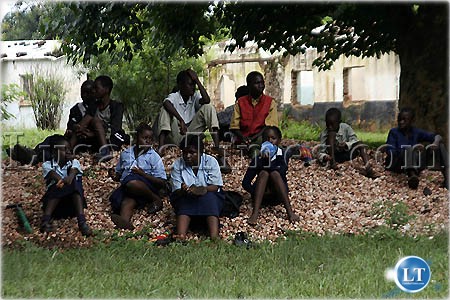
Here is Kabimba verbatim: “As the PF, we are determined to see to it that we eliminate the use of English as a language of instruction in our schools and replace it with our own Zambian languages.”First, which schools is he talking about? Certainly not the American International School, Nkwazi, Rhodes Park, Baobab, Lusaka International Community School, Mpelembe, Lechwe, Musukili, Banani, Chengelo, and Lake Road.
[pullquote]
Kabimba is targeting the vulnerable—children of the middle and lower classes.They are the sacrificial lambs.
[/pullquote]He will not let his children to learn Bemba, Nyanja, Lozi, or Tonga. They are the “digital babies” a.k.a. millennials or Generations Y and Z, growing up with technology. Technology has become part of their education and pass-time. A day can’t go by without the use of a computer or cellphone.Social networking is their quotidian occupation—their daily life activity. It is the way they communicate, work, and play. They interconnect with their friends around the world by blogging, twitting, texting and via Facebook. They are also able to visually interact with their friends using webcam. I bet when they heard Kabimba’s dictum they texted “lol.” Some wrote “dude’s nuts.”
It is not them Kabimba is targeting. It is your children; children of you the PF cadre disrupting rallies organized by the opposition; Children of you the PF blogger hauling insults at me; children of you the vendor scotched by the sun because you don’t want your child to be like you; you the marketeer trying very hard to make enough for your child’s school fees and uniform. You are the ones he has in mind.
Kabimba is targeting the vulnerable—children of the middle and lower classes; children of miners, civil servants, rural dwellers, and anyone below tycoon status. They are the sacrificial lambs. He knows their parents will jump at anything uttered by a cabinet minister.
[pullquote]
I can’t envision Michael Sata making Tonga a language of instruction in schools.
[/pullquote]
“What we have is a colonial hangover,” so Kabimba says.
Sounding like Ngugi wa Thiongo, he is telling middle and lower class parents that English is a relic of colonialism; that, it is, as Ngugi describes it, a “cultural bomb…that continues as a process of erasing memories of pre-colonial cultures and history as a way of installing the dominance of new, more insidious forms of colonialism.” And some believe him.
What Kabimba fails to understand is that English is not the same as it was in the 20th Century. It has gone beyond imperialism and ceased to be a language of identification. It has metamorphosed into an indispensable vernacular language of a highly-tech global village in which we all now live.
Zambian children are in a world far removed from Kabimba’s world in which children of the rich and the poor have to be active participants or remain forever ignorant. It’s a world in which our children have to join other children of the world to innovate, invent, and build. And to do that they have to learn at the same rate as their peers.
In other words, we have no choice but to make each and every child in Zambia digital savvy and for that we are going to need not Bemba, Nyanja, Lozi, or Tonga, but English to succeed.
It is English that has provided modern technology a conduit for consummate global interaction. English has emerged as the chief foreign language in Asia, the Middle East, East Europe, and South America. Young Chinese, Russians, Indonesians, are all learning English so they can communicate with others around the world.
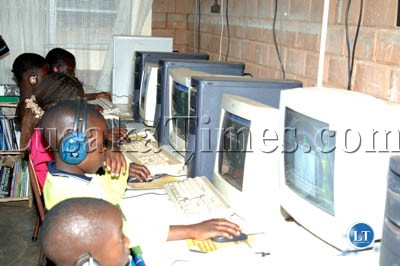
Please someone tell Kabimba that the world of the Internet has become such an important aspect of our lives we cannot afford to backtrack. Our children need the English language more than before. Each Zambian child must have access to a computer and must learn to operate any new device without hesitation.
But Kabimba won’t budge. He is “concerned” that our languages are dying and our cultural traditions are diminishing; that the English language is producing a weakened social constituency that is resorting to speaking with an accent.
Here is Kabimba again: “Research undertaken has revealed that every minute a language dies. This is a deliberate effort by our colonial masters to kill our languages which [are] a vehicle for personal identity…if a language is killed, it’s as good as killing a human being.”
[pullquote]Our children need the English language more than before[/pullquote]
He sounds like the young Kenneth Kaunda in the 1950’s trying to stop the British from imposing English on us (which he did not). Kabimba’s facts are wrong. Ethnologue estimates 7,000 languages are spoken on Earth. If a language died every minute, it would take not more than 5 days to expunge them.
Languages have been disappearing from time immemorial and they continue to erode up to this day. English-American linguist and phonetician Peter Ladefoged argues that “language death is a natural part of the process of human cultural development, and that languages die because communities stop speaking them for their own reasons.”
I second that. Today the disappearance is not caused so much by warfare and genocide, or by epidemic diseases such as malaria and AIDS, but by the supercilious elitists like Kabimba who make English the only spoken language in the house to distance themselves from the middle and lower classes.
Zambia is multilingual with 73 languages. According to many linguistic books, the only extinct Zambian language is the Kxoe also known as Khoi or Khwedam and the only two that face obsolescence are Mbowe and Yauma. Records show Kxoe is spoken in Namibia, Angola, Botswana, South Africa, and hardly in Zambia. So, we are not doing badly in this department.
Zambia has four major languages—Bemba, Nyanja, Tonga, and Lozi. Bemba and Nyanja are the two official languages. Which one will supplant English?
Bemba is the most favored. Bemba belongs to the largest ethnic group in Zambia and therefore enjoys linguistic power. Although it is the most spoken, and the official language of the Copperbelt, it has never been given the status of a national language. But now with a Bemba president, it is highly possible. If Bemba replaces English it is likely that other tribes, especially those with opposition strongholds will oppose or shun the move. This could lead to violent protests.
[pullquote]President Michael Sata and his vice should stop using English and engage the services of an interpreter at every ceremony[/pullquote]
Nyanja is next. But Nyanja is not authentic. It is a pidgin of the Eastern and Lusaka Provinces with strong roots in Malawi where it is known as Chewa and is a national language. In Zambia, Mozambique, Zimbabwe, and South Africa, Nyanja is a language for immigrants.
Although in Zambia, Nyanja is dominated by Nsenga and uses a plethora of English words, it is still “foreign,” and therefore must be removed from Kabimba’s “indigenous” list. The other two languages, Lozi and Tonga, face even greater challenges in that they are mainly provincial. I can’t envision Michael Sata making Tonga a language of instruction in schools.
What Kabimba and the PF are likely to do is to demarcate the country into four with Bemba catering to northern and north-western; Nyanja to the east; Tonga to the south; and Lozi to the west. The question is what happens when the kids in these regions go to the University of Zambia? What language will the university be using in their lectures and research?
Besides, for Kabimba and his PF cohorts to succeed they will have to start at the top. President Michael Sata and his vice should stop using English and engage the services of an interpreter at every ceremony. Sata must then spearhead a campaign to remove English as a national language from the Constitution and replace it with the chosen local language. This will mean that the use of English in Parliament will cease and all business will be conducted in the chosen local language.
We, middle and low class parents, must tell Kabimba to keep away from our children. We must tell him and the PF government to instead concentrate on ensuring our children receive an education compatible with 21st Century standards. We must tell the president to electrify all schools no matter how rural. Where hydro power will not reach, he must use solar power. We must tell him to buy hundreds of computers and ensure each school has between 10 and 20. If the president cannot afford it, he must ask his first world allies to donate discarded but working computers.
Give all our children a chance to showcase their ingenuity.
FAZ president and soccer icon Kalusha Bwalya says he is saddened by Zambia’s unceremonious exit from the 2013 Africa Cup of Nations.
Kalusha said Zambia were unfortunate to be eliminated in the first round.
The ex-Chipolopolo captain said Zambia have themselves to blame for their poor display at the Nations Cup being staged in South Africa.
“I am sad and disappointed. We all had great expectations for this AFCON. Unfortunately we have to leave at this stage,” Kalusha told Fazfootball.com on Wednesday.
Zambia finished third in Group C with three points,two behind pool winners Burkina Faso and Nigeria who had five points apieace while Ethiopia were bottom with a point.
“We only have ourselves to blame. I didn’t see one team that was superior to us,” he added.
“We were unlucky to exit in such a way, which can happen in football. The playing pitch (at Mbombela Stadium) didn’t help matters either.”
The vanquished Zambia squad is on Thursday expected to return from South Africa.
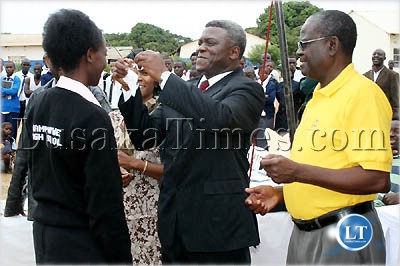
The opposition Movement for Multi-party Democracy (MMD) has said that it has been vindicated by the court judgment that nullified the invalidation of Dr. Nevers Mumba’s election.
On Monday, the high court ruled against major Richard kachingwe invalidation of Nevers Mumba as party president.
MMD vice president for administration, Brian Chituwo said that he is now hopeful that the court judgment will put to rest all desires by some politicians to ruin the party.
Dr. Chituwo said that it should now be realized that the country only has one genuine MMD under the leadership of Dr. Nevers Mumba.
Speaking at a media briefing, Dr. Chituwo said that Major Richard Kachingwe’s move to nullify the election of Dr. Mumba only shows the highest order of indiscipline.
He said that it is good that the court nullified the invalidation because it is nowhere in the party constitution.
Dr. Chituwo has since called on all party members to unity and rally behind party president, Dr. Nevers Mumba.
Meanwhile, Times of Zambia reports that records at the office of the Registrar of Societies show that former Republican President Rupiah Banda and former Zambian High Commissioner to Canada Nevers Mumba are still active MMD and Reform Party (RP) leaders, respectively.
The MMD structure shows that Mr Banda is president of the MMD while the national chairperson is Michael Mabenga.
Home Affairs Minister Edgar Lungu said this at a media briefing in Lusaka yesterday.
[pullquote]Last week, Mr Lungu warned that he may be forced to deregister the MMD if its squabbles became a danger to the peace and stability of the country.[/pullquote]
Records indicate that Kabinga Pande is vice-chairperson, Jeff Kaande as deputy national secretary while Suresh Desai and late former vice-president George Kunda are listed as national trustees.
The RP structure shows that Dr Mumba is still party president with senior party officials listed as Eve Sanderson, party secretary N. Nyirongo, administrative secretary M. Sokoni, party treasurer J. Temani while R. Kaputula was listed as a senior member.
Mr Lungu, who was amplifying on the statement he issued last week that he may be forced to deregister the MMD, said the former ruling party had failed to update records despite several reminders.
The minister said the records showed that Mr Banda and Dr Mumba were active presidents of the MMD and RP, respectively.
MMD has been embroiled in internal problems that have resulted in a splinter group led by ousted national secretary, Richard Kachingwe.
Mr Lungu said the Government would follow records from the Registrar of Societies because it was a legal body charged with the mandate of overseeing national records, including operations of parties.
Last week, Mr Lungu warned that he may be forced to deregister the MMD if its squabbles became a danger to the peace and stability of the country.
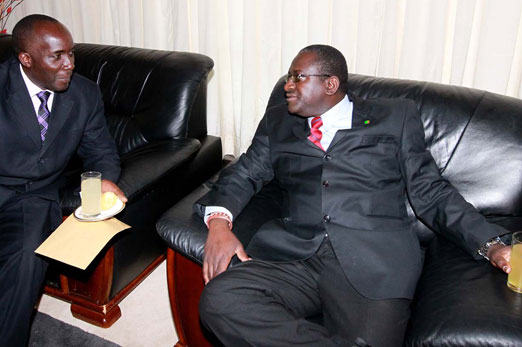
Lands, Natural Resources and Environmental Protection Minister Wilber Simuusa has revealed that 70 percent of the 40,000 hectares of the land in Lusaka has been illegally allocated to owners.
Speaking in Luanshya when he met councilors at the Civic centre after inspecting Land development funds usage in Luanshya, Mr. Simuusa bemoaned that land allocation in the country had been taken over by cadres of various political parties, whom he warned that the law will visit them.
“We are aware of cadres who have taken up land in some areas but I want to warn them that there will be no sacred lambs in arresting these people,” he said.
Mr. Simuusa praised the Luanshya Municipal Council for its land management.
He further said councils that have mismanaged funds like the Kitwe City Council risk not being given some more money until they account for the money.
“We want to ensure change in the way we deal with land issues in this country because as it is now things are in a mess and that is why we have started computerizing the whole system. We have since engaged an Israeli Company to set up five servers where all the land issues will be connected,” he said.
And Luanshya Mayor Nathan Bwalya says the council will work harder to uphold transparency and accountability in land allocation.
The Mayor said land is a critical component in the development of the country and allocation of it has to be transparent.
“We are happy that the Minister has rated us as one of the best performing councils in the country where the management of the Land Development Funds is transparent. This will make us strive to work even harder to uphold the standard,” he said.
Mr. Simuusa is on the province to inspect council’s usage of the Land Development Funds.
ZANIS
A parliamentarian has appealed to government to provide money to Members of Parliament (MPs) to enable them travel to remote parts of their constituencies to sensitize their constituent on the rebased currency.
Speaking to ZANIS in an interview, Milanzi Movement for Multiparty Democracy (MMD) Member of Parliament (MP) Whiteson Banda said it was not easy for Members of Parliament to cover remotest parts of their constituencies because of financial constraints.
Mr. Banda said he had traveled to his constituency to sensitise his electorates but could not cover the whole area because he was using personal funds.
He said many people in his constituency have embraced the new currency but added that there was need for more sensitization on the matter.
Meanwhile, MMD Mangango MP Robert Chiseke Taundi disclosed that some people in his constituency still did not understand the rebased currency.
Mr. Taundi said not much sensitization had been done by the Bank of Zambia in his area and that many people lacked knowledge on the new currency.
He explained that some people, especially the aged, were finding it difficult to relate values of the new currency to the old ones.
He reiterated the call for funds to be allocated to parliamentarians to enable them travel to their areas and actively participate in sensitizing people.
ZANIS
Over 16,000 companies have paid annual returns to the Patents and Companies Registration Agency (PACRA) since the amnesty for companies to pay their annual returns penalties started last year.
PACRA Public Relations Officer Vaida Bunda said following the extension of the deadline for the waiver from 31st December to 31st January 2013, PACRA had been able to roll out the exercise to rural areas especially places where the agency had no offices.
Ms. Bunda was speaking to ZANIS in Lusaka yesterday.
She urged companies that had not yet submitted their annual returns to do so before the end of the business day tomorrow, 31st January 2013.
She added that PACRA would not extend the deadline again noting that companies that would not file their returns will automatically be deregistered and deleted from the agency’s database.
Ms. Bunda explained that PACRA was keen to reducing the number of defunct companies on its database in readiness for digitalization to commence on 1st February 2013.
She revealed that the agency had initially planned on digitalise its records this month, January 2013, but postponed the exercise due to the extension of the amnesty.
And Ms. Bunda disclosed that the agency has registered over 200 businesses during the mobile registration of companies it was conducting in various parts of the country.
She said PACRA embarked on a mobile registration of companies to make its services accessible to people who otherwise would find it both costly and inconveniencing as they had to travel from remote places to where the agency has offices.
Last year, PACRA granted amnesty to all defaulters irrespective of the number of years a particular company had not remitted its annual returns.
The amnesty begun on October 1, 2012 and was expected to end on December 31. However PACRA extended the deadline to 31st January this year stating that the big beneficiaries of the amnesty were businesses from urban areas.
ZANIS
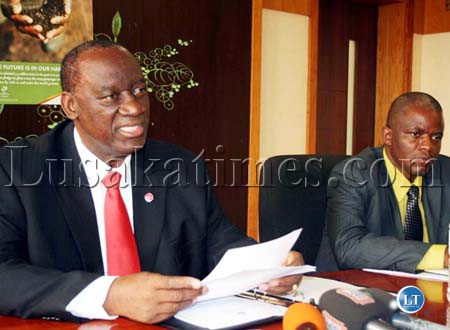
Lusaka Chief Resident Magistrate Joshua Banda has reserved ruling in a matter involving former Information and Broadcasting Services Minister Ronnie Shikapwasha, his former Permanent Secretary Samson Phiri and Journalist Chanda Chimba III.
Magistrate Banda said yesterday morning when the matter came up for ruling after receiving written submissions after the last session from both parties, that he has reallocated the matter from his court to a new magistrate, Catherine Walubita.
Magistrate Walubita has been transferred from Ndola to Lusaka.
During the last sitting, defence lawyer Major Lisita applied to have his client Chanda Chimba III charged alone on a separate indictment as opposed to the current situation where he is charged with Lieutenant General Shikapwasha and Dr. Phiri.
However, the state prosecution team argued the three accused persons were facing offences that were inter linked in some way thereby it was correct to have them charged from one indictment.
The prosecution team argued that the defence team will understand the link in the charges when trial begins in the matter.
At this point, Magistrate Banda ordered the two parties to submit their arguments in written before the three accused persons could proceed in taking plea.
Magistrate Banda has since adjourned the matter to February 12, this year and it will be heard by magistrate Walubita.
Lt. Gen. Shikapwasha, Dr. Phiri and Mr. Chimba are facing charges of abuse of authority, unlawful printing and publication and being in possession of property suspected to be proceeds of crime.
Meanwhile, four youths that were arrested in connection with the murder of opposition Forum for Democracy and Development (FDD) leader Edith Nawakwi’s step daughter have appeared in the same court for explanation of the charge.
Evelisto Mulundu, 20, a garden boy, Aaron Banda, a garden boy, Clive Fuya 26, Lyford Moyo 24, a waiter, are charged with murder contrary to section 200 of the penal code and cap 87 of the laws of Zambia.
It is alleged that Mulundu, Banda, Fuya and Moyo on January 7 this year jointly and whilst acting together did murder one Hatamba Hambulo.
In the second, the four are charged with aggravated robbery contrary to section 294 (1) of the penal code and cap 87 of the laws of Zambia.
Particulars of the second charge are that Mulundu, Banda, Fuya and Moyo on January 7 this year jointly and whilst acting together did steal a motor vehicle namely Honda Fit registration number ALC 4598, one camera and two cell phones altogether valued at K46 million (KR46,000), the property of Hatamba Hambulo.
It is further alleged that at or immediately before or after the time of the theft, the four did use or threaten to use actual violence to Hatamba in order to retain or obtain the things or prevent resistance from her.
The four will again appear for mention on February 12 as the state waits for instructions from the Director of Public Prosecution office (DPP).
Hatamba’s body was early this month found murdered and dumped in a manhole at her house in Ibex Hill with her legs and arms tied.
ZANIS

China has pledged more investments into Zambia especially in telecommunications, infrastructure and mining sectors.
And Standard Chartered Bank managing director Mizinga Melu said Africa-China Trade has risen tenfold in less than a decade.
Chinese Ambassador to Zambia Zhou Yuxiao said China was keen to continue participating in the economic development of Zambia especially in the areas of infrastructure development, telecommunications and mining.
“China will continue increasing investment in Zambia because of the investment climate prevailing in the country,” Mr Zhou said.
Speaking at the Chinese New Year dinner in Lusaka hosted by Standard Chartered Bank for Chinese clients on Tuesday evening, Mr Zhou said the trade between China and Zambia has continued to grow through the Africa –China Trade Corridor.
He said the Africa –China Trade Corridor has reached US$200 billion but that the figure should increase considering that trade with a single country, South Korea was over $250 billion.
Mr Zhou said he was pleased to note that Standard Chartered Bank was now offering on-shore Renminbi/Chinese Yuan (RMB) trading accounts in Zambia which he said was acting as a bridge between China and Zambia.
He said that was facilitating fast and effective trade relations with Chinese supplies, buyers and other related global customers.
Meanwhile Mrs Melu said Africa-China trade has significantly risen by tenfold in less than a decade and that looking forward Africa was expected to have 1.1 billion people of working age by 2040 and would represent a very attractive consumer base for expanding companies to tap in.
“Standard Chartered has the history, the presence and the expertise to make a tangible difference in supporting this increasing channel of economic growth,” Mrs Melu said.
Mrs Melu said the trade and investment linkages between the two countries were significant and the bank was well positioned to serve clients and customers that trade and invest in the two markets.
She said the Africa –China Trade Corridor has become the most influential socio-economic development for Africa because of its resilience, in the face of the world most acute economic downturn.
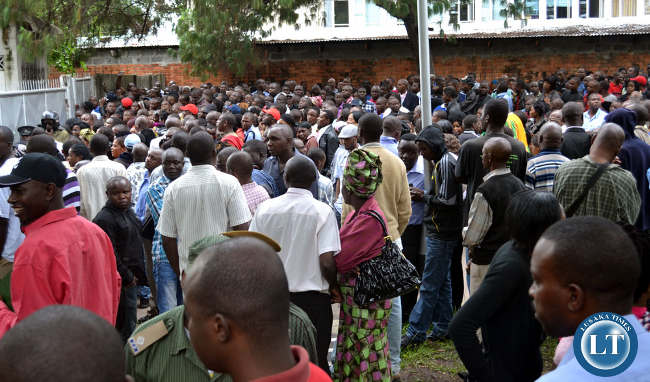
Kitwe City Council (KCC) will not lift the suspension to sale residential and commercial plots in the district until an effective mechanism has been found to manage the exercise.
KCC suspended the exercise after a near stampede which left some people bruised when over 1000 people gathered to buy plots with others spending the night at the council.
KCC acting public relations manager Dorothy Sampa said in an interview that the council has not yet found a strategy to help it manage the sale of plots.
“We are still strategising and we have not gone anywhere with regard to come up with a strategy to manage the programme,” Ms Sampa said.
KCC Town Clerk Bornwell Luanga suspended the sale of plots and promised the council would formulate a system to assist the local authority managed the exercise.
Some glass panes at the civic centre were shattered during the confusion and a woman was bundled in a police vehicle before being whisked away by police officers after a physical confrontation with them at the council.
The council was selling 900 plots in Ndeke and Chamboli residential areas and application forms are fetching a non refundable fee of KR500.
High cost plots are costing KR16000, medium (KR8,000) and low cost (KR4,000) and other plots are for commercial to accommodate a shopping centre and filling station.
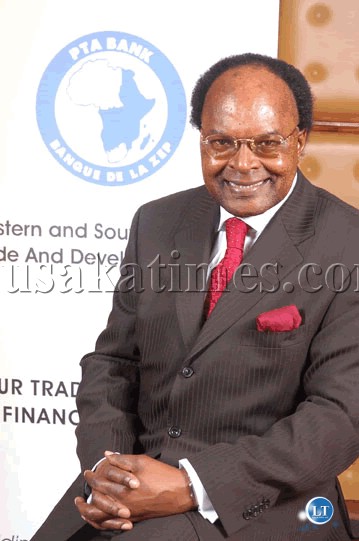
THE new Kwacha notes are durable and the people who are deliberately soiling them or subjecting them to harsh handling as way of proving their durability should immediately stop.
Bank of Zambia (BoZ) governor Michael Gondwe said in Ndola yesterday that it was important for members of the public to be mindful that all bank notes have limited lifespan which was largely determined by how the public handled them.
Dr Gondwe, said during the official opening of the Indo Zambia Bank, Ndola Jacaranda Mall Agency and the inauguration of the refurbished Ndola Branch, that BoZ had put in place a Clean Banknote Policy, which encourages the proper handling of bank notes.
“The Central Bank therefore, wishes to advise members of the public not to subject the banknotes to harsh handling or indeed experimentation. We expect that members of the public will ensure that banknotes are handled in a proper manner to preserve their lifespan,” he said.
He added that unlike banknotes, coins have a much longer lifespan and were convenient for lower value transactions and change purposes.
Dr Gondwe said the Central Bank increased the minimum capital requirement for banks to K520 billion and 104 billion for foreign and local banks respectively in its quest to ensure the financial sector played an active role in financing the productive sector of the economy.
Speaking earlier Indo Zambia Bank, managing director Shankardas Gupta said the bank was solid commanding strong financial fundamentals with high net worth, high capital adequacy ratio.
He said Indo Zambia’s total business mix was now in excess of KR 2.1 billion (US$4 billion), while the total deposits rose to KR 1.2 billion (US$2.3 billion) with the loans and advance portfolio crossing the level KR850 million (US$160 million).
“The success of Indo Zambia Bank can be attributed to our very strong parentage and valuable support of the governments of Zambia and India through the three shareholding banks of international repute.
“Together these shareholding banks impart unmatched strength to our bank as their combined balance sheet size is over US$200 billion,” Mr Gupta said.
He said apart from their strong network in India, they have a global branch network spread across 30 countries at all their major international financial centres of the world.
Indo Zambia Bank which was formed in 1984 by the governments of Zambia and India to step up modern banking and garner savings of the community and use the resources for social good now has 17 branches across the country, which will increase to 22 and four agencies soon.
Indo Zambia board chairperson Orlean Moyo said the Government’s maintaining and sustaining of stable macro-economic environment was responsible for the bank’s expansion programme and the current vibrancy being experienced by the Zambian economy.
Rainford Kabala says Zambia will quickly pick themselves up from their bruising exit from the 2013 Africa Cup.
Kalaba said in Nelspruit after the game that lessons were leant but that the sooner Zambia recovered from the shock exit the better with the 2014 FIFA World cup qualifiers looming over the horizon.
“We just have to go back and refresh and get back to earth,” Kalaba said.
Zambia finished third on three points after a scoreless draw against Burkina Faso on Tuesday at Mbombela Stadium in Nelspruit.
They finished on two points behind Group C winners Burkina Faso and Nigeria who also ended on five points.
“That’s football we are not the first team to be eliminated. So just have to forget and move forward,” Kalaba said.
“We have discussed as a team there is nothing that has changed in the team spirit, the spirit remains the same.
“The coach said it is part of football and look forward because even if you look back nothing ill chance there is a World Cup qualifier in March so if we disturb ourselves we will not go anywhere.”
Zambia’s next major engagement will be Lesotho whom they face in their third Group D match on March 22 in Maseru.
Meanwhile, the home-based team has a chance of returning to South Africa in 2014 when they kickoff their 2014 CAF African Nations Championship qualifiers in June with a two-legged date against Botswana.
Zambia will be away in the first leg on June 22 and host The Zebras in the return leg on July 6.
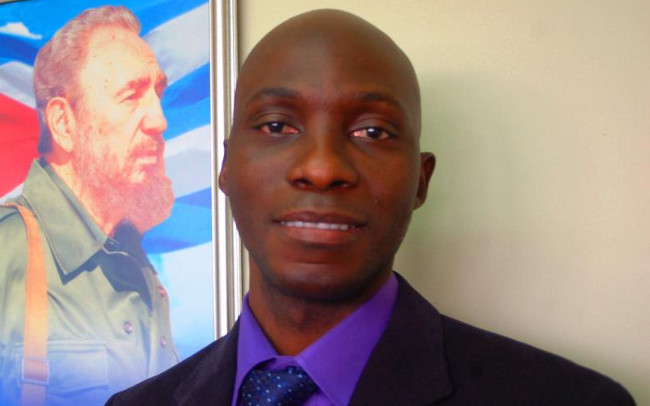
The Patriotic Front (PF) has dismissed reports from some section of society suggesting that one of its cadres died in mistaken identity situation in the fracas with the opposition United Party for National Development (UPND) on Sunday.
PF and UPND fought before the latter held a public rally in Kabwata constituency on Sunday.
PF media and publicity director Chanda Mfula said the party was not aware of any PF cadre who was allegedly killed in the fight.
“Such reports have not reached my office. I have not received such reports,” Mr. Mfula said.
And the police are not aware of any loss of life during the clash between cadres from the two political parties last Sunday.
Lusaka Province Police Commissioner Joyce Kasosa said police were not aware of any suspected PF cadre that was killed in the violence that took place in Kabwata constituency between the two political parties.
Ms. Kasosa disclosed that her office only received a report of two people that were injured during the fracas before a UPND rally.
She said the two were rushed to the University Teaching Hospital (UTH) where they were treated and later discharged.
Ms. Kasosa told ZANIS in an interview in Lusaka that she was however not sure of which party the duo belonged to.
There are reports suggesting that during the fracas, PF cadres allegedly descended on their own member in a mistaken identity situation.
It is alleged the person died later at the University Teaching Hospital.
ZANIS